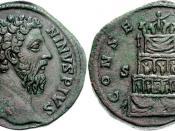Gladiator, though not the most intellectually stimulating film of this decade, it was deeper and more complexed than one might gather from it at first glance. Its theme was not a simple "good-guy versus bad-guy" as one might gather from the title. In fact, Gladiator in essence had very little to do with gladiators. It dealt with the tragic changing of power, deceit, and old alliances. It depicts Maximum's struggle against decadence in the Roman society and his efforts to give Rome back to the people while at the same time revenging his murdered family.
The plot of this film is relatively simple. Marcus Aurelius, emperor of Rome at the time, asks Maximus, his favorite general, to become emperor after his death and eventually restore the power to the senate. Commodus, the son of emperor, is jealous of Maximus and kills his father, afterwards asking Maximus for his loyalty.
When Maximus refuses, Commodus attempts to have him and his family killed; he succeeds in killing his family, but fails to kill him. Instead, Maximus is captured by slave traders and becomes a gladiator, a job that lends itself to his leadership skills and warrior abilities. Throughout his career as a gladiator, Maximum's primary objectives are to save Rome from Commodus and to avenge the murder of his family. Conveniently, both objectives have the same solution.
The film opens, essentially, with a scene depicting a pitched battle between Romans and German barbarians. Maximus is at this point commander of a Roman legion, and the legion performs masterfully. Against wildly roaring barbarians coagulated into an unruly mob, the Roman legionnaires advance with discipline and even, in some ways, grace. All the while, the superior Roman technology rains fire upon the barbarians. The effect of this imagery is to illustrate...


